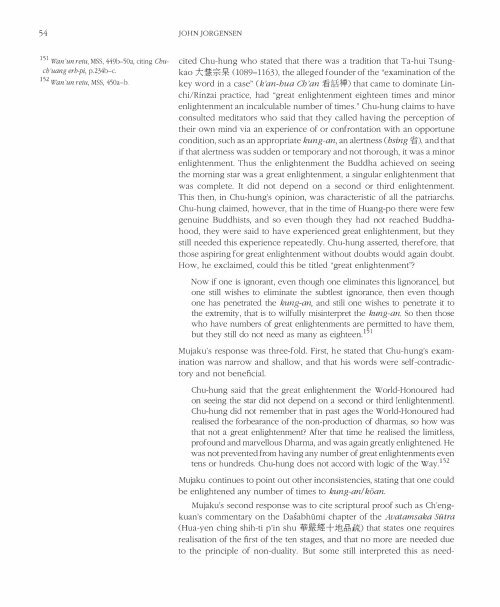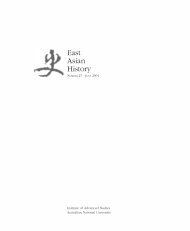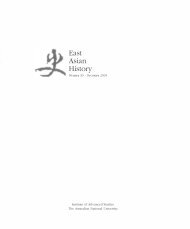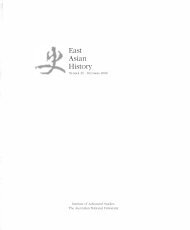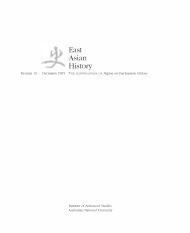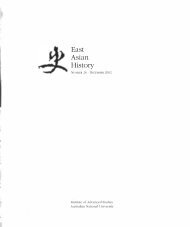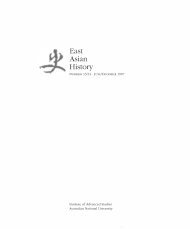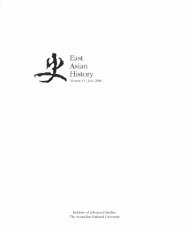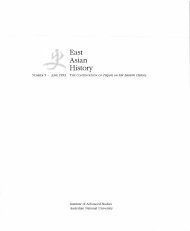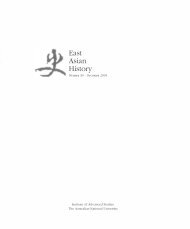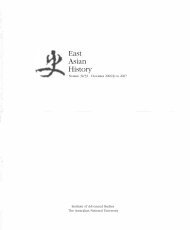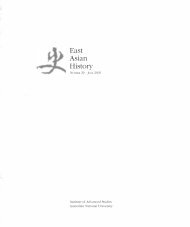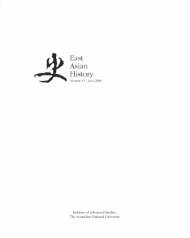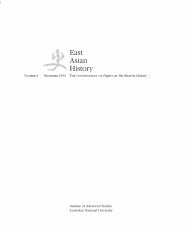Mujaku Dochu (1653-1744) and 17th-Century ... - East Asian History
Mujaku Dochu (1653-1744) and 17th-Century ... - East Asian History
Mujaku Dochu (1653-1744) and 17th-Century ... - East Asian History
Create successful ePaper yourself
Turn your PDF publications into a flip-book with our unique Google optimized e-Paper software.
54<br />
JOHN JORGENSEN<br />
151 Wa n 'un reiu, MSS, 449b---50a, citing Chuch<br />
'uang erh-pi, p.234b-c.<br />
kao 7\JI** 0089-1163), the alleged founder of the "examination of the<br />
cited Chu-hung who stated that there was a tradition that Ta-hui Tsung<br />
152 Wa n 'un reiu, MSS, 450a-b. key word in a case" Ck'an-hua Ch 'an (iJl'ftW) that came to dominate Linchi/Rinzai<br />
practice, had "great enlightenment eighteen times <strong>and</strong> minor<br />
enlightenment an incalculable number of times." Chu-hung claims to have<br />
consulted meditators who said that they called having the perception of<br />
their own mind via an experience of or confrontation with an opportune<br />
condition, such as an appropriate kung-an, an alertness Chsing 1i§), <strong>and</strong> that<br />
if that alertness was sudden or temporary <strong>and</strong> not thorough, it was a minor<br />
enlightenment. Thus the enlightenment the Buddha achieved on seeing<br />
the morning star was a great enlightenment, a singular enlightenment that<br />
was complete. It did not depend on a second or third enlightenment.<br />
This then, in Chu-hung's opinion, was characteristic of all the patriarchs.<br />
Chu-hung claimed, however, that in the time of Huang-po there were few<br />
genuine Buddhists, <strong>and</strong> so even though they had not reached Buddhahood,<br />
they were said to have experienced great enlightenment, but they<br />
still needed this experience repeatedly. Chu-hung asserted, therefore, that<br />
those aspiring for great enlightenment without doubts would again doubt.<br />
How, he exclaimed, could this be titled "great enlightenment"?<br />
Now if one is ignorant, even though one eliminates this [ignorance], but<br />
one still wishes to eliminate the subtlest ignorance, then even though<br />
one has penetrated the kung-an, <strong>and</strong> still one wishes to penetrate it to<br />
the extremity, that is to wilfully misinterpret the kung-an. So then those<br />
who have numbers of great enlightenments are permitted to have them,<br />
but they still do not need as many as eighteen.151<br />
<strong>Mujaku</strong>'s response was three-fold. First, he stated that Chu-hung's examination<br />
was narrow <strong>and</strong> shallow, <strong>and</strong> that his words were self-contradictory<br />
<strong>and</strong> not beneficial.<br />
Chu-hung said that the great enlightenment the World-Honoured had<br />
on seeing the star did not depend on a second or third [enlightenment].<br />
Chu-hung did not remember that in past ages the World-Honoured had<br />
realised the forbearance of the non-production of dharmas, so how was<br />
that not a great enlightenment? After that time he realised the limitless,<br />
profound <strong>and</strong> marvellous Dharma, <strong>and</strong> was again greatly enlightened. He<br />
was not prevented from having any number of great enlightenments even<br />
tens or hundreds. Chu-hung does not accord with logic of the Way.152<br />
<strong>Mujaku</strong> continues to point out other inconsistencies, stating that one could<br />
be enlightened any number of times to kung-ani koan.<br />
<strong>Mujaku</strong>'s second response was to cite scriptural proof such as Ch'engkuan's<br />
commentary on the Dasabhumi chapter of the Avatamsaka SiUra<br />
CHua-yen ching shih-ti p'in shu ¥.fiiH+tfu£jlfrD that states one requires<br />
realisation of the first of the ten stages, <strong>and</strong> that no more are needed due<br />
to the principle of non-duality. But some still interpreted this as need-


